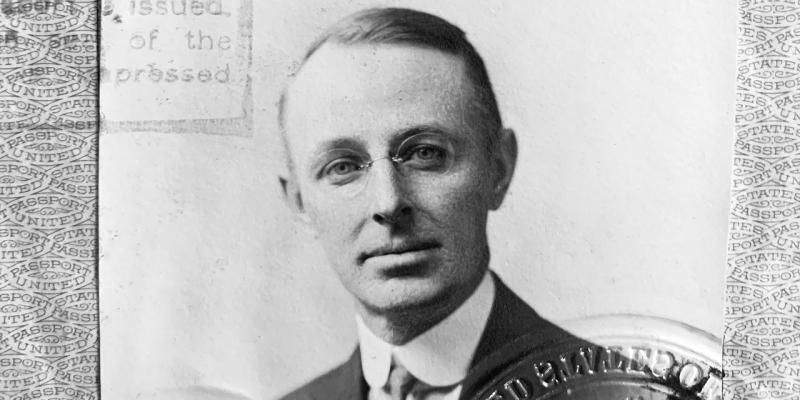'William F. Buckley Sr.' Review: Conservatism's Mexican Roots
By: Andrew R. Graybill (WSJ)



Reflecting on the Revolution in France in his classic 1790 treatise, the Anglo-Irish politician and philosopher Edmund Burke wrote that "whenever our neighbor's house is on fire, it cannot be amiss for the engines to play a little on our own." More than a century later, William F. Buckley Sr.—father and namesake of the conservative American icon—took a similar view of the Mexican Revolution (1911-20), sharing Burke's pragmatic approach to government as well as his concerns about liberal contagion. But unlike Burke, who observed the happenings in France from the safety of England, Buckley was a participant in the drama that unfolded in Mexico, where he had moved in 1908. This is the subject of "William F. Buckley Sr.: Witness to the Mexican Revolution, 1908-1922," a fascinating if uneven book by the independent historian John A. Adams Jr.
Considering the Buckley family's indelible association with New York City and its leafy environs, it may come as a surprise that Buckley pere was raised in South Texas, where he was born in 1881. Will and his siblings grew up poor, "blessed with neither electricity, gas, telephone, running water, nor refrigeration," as one of the children later recalled. But they were bilingual, perhaps of necessity, given that 90% of the 2,000 residents of San Diego, Texas, their hometown, were of Mexican descent. Despite his straitened circumstances, Will earned undergraduate and law degrees from the University of Texas, and shortly thereafter opened a legal practice in Mexico City, quickly expanding into oil and real estate, assisted by his brothers Claude and Edmund. The business climate in Mexico was promising for foreigners like the Buckleys, thanks to the pro-development policies of its autocratic president, Porfirio Diaz, who would rule the country for more than three decades.
Buckley’s prominence among the American expatriate community made him a natural conduit between officials in the U.S. and Mexico once the latter country was plunged into chaos following the ouster of Díaz in 1911. Buckley was Zelig-like, cropping up repeatedly at key moments. He visited the U.S. Embassy in February 1913 during the Decena Tragíca (Ten Tragic Days), when Francisco Madero, Díaz’s successor, was overthrown in a coup led by Gen. Victoriano Huerta, instigating a spasm of violence that killed thousands in Mexico City. Likewise, Buckley found himself in the port of Veracruz in April 1914 when U.S. troops landed there to block an arms shipment intended for Huerta, who had lost the support of President Woodrow Wilson. Allegedly, Buckley was even on hand at the celebrated December 1914 meeting of rebel leaders Pancho Villa and Emiliano Zapata in Xochimilco.
Buckley favored Huerta, serving as the regime’s legal counsel in negotiations with the U.S. aimed at preventing hostilities between the two nations. He was thus dismayed by the ascendance of Venustiano Carranza and, later, Álvaro Obregón. Both leaders endorsed the Mexican Constitution of 1917, including Article 27, which asserted national ownership of natural resources while circumscribing the economic power of the church. These provisions horrified Buckley, who was a staunch believer in free-market capitalism as well as a devout Roman Catholic. In the bulletin of the American Association of Mexico, an advocacy group he founded in 1919, Buckley denounced the “dangerous Bolshevist movement” that had taken root in Mexico. Notwithstanding his professed commitment to isolationism, he bankrolled a feckless 1921 coup against Obregón, who expelled Buckley from the country. Buckley then shifted his business operations to the emerging oil fields of Venezuela, kickstarting what would become a global conglomerate and financial powerhouse. He spent his golden years in Connecticut and South Carolina and died in 1958.
Among the book’s greatest strengths is the depth and quality of its research. Mr. Adams, who has written more than a dozen volumes—mostly about Texas and Mexico—makes terrific use of primary documents, especially those found in the Benson Latin American Collection at the University of Texas. That archival work, he tells us, was complicated by the chaotic state of Buckley’s papers, which were borrowed by the U.S. State Department in the 1920s and returned in a jumbled mess several years later. Moreover, Mr. Adams consulted with several Buckley family members, including a descendant based in Mexico City, as well as Judge James L. Buckley, the sole survivor among the 10 children born to Will and his wife, Aloise. Judge Buckley, who recently celebrated his 100th birthday, contributed a foreword acknowledging the importance of Mexico to the family’s understanding of itself, writing that “it had somehow permeated our DNA.”
Mr. Adams’s style, however, does not make for easy reading. Even granting that the Mexican Revolution is extraordinarily complex—consider that, in the revolving door that was the Mexican presidency at the time, one head of state served for less than an hour in 1913—the author presumes more familiarity with events than can be reasonably expected from a general audience. At scarcely more than 200 pages of text, the book leaves little room for helpful explanation while consigning some critical events to the cutting-room floor. Chief among these is the Plan of San Diego, a 1915 irredentist movement aimed at reclaiming for Mexico the parts of the American Southwest it lost in its war with the U.S. during 1846-48. That the plot—which led to the brutal repression of Mexicans in South Texas—was incubated in Buckley’s hometown makes this omission all the more surprising.
As another of his offspring once said, Buckley’s experience in Mexico “deepened his frontier suspicions of autocratic [leaders] (and big government in general), and this attitude dyes all his children strongly.” Surely that was true of Buckley’s favorite son, William F. Buckley Jr., who, after serving a short stint with the CIA in Mexico City (he, too, was fluent in Spanish), founded National Review in 1955, which remains one of the leading voices of the conservative movement. The elder Buckley helped fund his son’s upstart venture with a $100,000 contribution from a fortune that traced its origins to Mexico during the most tumultuous period of that nation’s history.
Mr. Graybill is a professor of history and director of the William P. Clements Center for Southwest Studies at Southern Methodist University.






Here we have the little know story of the father of the man who put Conservatism on the map. It's also nice to think that their influence may save us yet, though they would never get to see it.
The Book is:
William F. Buckley Sr.: Witness to the Mexican Revolution, 1908–1922